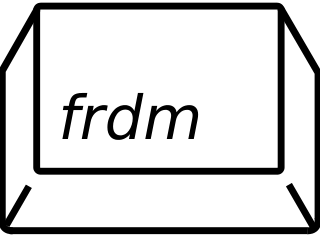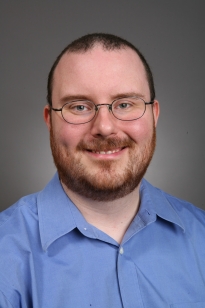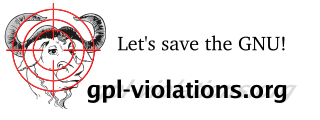Related Research Articles
The Artistic License is an open-source license used for certain free and open-source software packages, most notably the standard implementation of the Perl programming language and most CPAN modules, which are dual-licensed under the Artistic License and the GNU General Public License (GPL).

GNU is an extensive collection of free software, which can be used as an operating system or can be used in parts with other operating systems. The use of the completed GNU tools led to the family of operating systems popularly known as Linux. Most of GNU is licensed under the GNU Project's own General Public License (GPL).
The Open Software License (OSL) is a software license created by Lawrence Rosen. The Open Source Initiative (OSI) has certified it as an open-source license, but the Debian project judged version 1.1 to be incompatible with the DFSG. The OSL is a copyleft license, with a termination clause triggered by filing a lawsuit alleging patent infringement.

SCO Group, Inc. v. International Business Machines Corp., commonly abbreviated as SCO v. IBM, is a civil lawsuit in the United States District Court of Utah. The SCO Group asserted that there are legal uncertainties regarding the use of the Linux operating system due to alleged violations of IBM's Unix licenses in the development of Linux code at IBM. The lawsuit was filed in 2003, it has lingered on through the bankruptcy of SCO Group and the adverse result in SCO v. Novell, and was reopened for continued litigation by order of a new judge on June 14, 2013. Pursuant to the court order reopening the case, an IBM Motion for Summary Judgment was filed based upon the results of the Novell decision. On December 15, 2014, the judge granted most of IBM's motion, thereby narrowing the scope of the case, which remained open. On March 1, 2016, following a ruling against the last remaining claims, the judge dismissed SCO's suit against IBM with prejudice. SCO filed an appeal later that month. In February 2018, as a result of the appeal and the case being partially remanded to the circuit court, the parties restated their remaining claims and provided a plan to move toward final judgement.
In a series of legal disputes between SCO Group and Linux vendors and users, SCO alleged that its license agreements with IBM meant that source code IBM wrote and donated to be incorporated into Linux was added in violation of SCO's contractual rights. Members of the Linux community disagreed with SCO's claims; IBM, Novell, and Red Hat filed claims against SCO.
The Common Development and Distribution License (CDDL) is a free and open-source software license, produced by Sun Microsystems, based on the Mozilla Public License (MPL). Files licensed under the CDDL can be combined with files licensed under other licenses, whether open source or proprietary. In 2005 the Open Source Initiative approved the license. The Free Software Foundation (FSF) considers it a free software license, but one which is incompatible with the GNU General Public License (GPL).

The Software Freedom Law Center (SFLC) is an organization that provides pro bono legal representation and related services to not-for-profit developers of free software/open source software. It was launched in February 2005 with Eben Moglen as chairman. Initial funding of US$4 million was pledged by Open Source Development Labs.

Bradley M. Kuhn is a free software activist from the United States.

Free and open-source software (FOSS) is software that is available under a license that grants the right to use, modify, and distribute the software, modified or not, to everyone free of charge. The public availability of the source code is, therefore, a necessary but not sufficient condition. FOSS is an inclusive umbrella term for free software and open-source software. FOSS is in contrast to proprietary software, where the software is under restrictive copyright or licensing and the source code is hidden from the users.

gpl-violations.org is a not-for-profit project founded and led by Harald Welte in 2004. It works to make sure software licensed under the GNU General Public License (GPL) is not used in ways prohibited by the license.
Tivoization is the practice of designing hardware that incorporates software under the terms of a copyleft software license like the GNU General Public License, but uses hardware restrictions or digital rights management (DRM) to prevent users from running modified versions of the software on that hardware. Richard Stallman of the Free Software Foundation (FSF) coined the term in reference to TiVo's use of GNU GPL licensed software on the TiVo brand digital video recorders (DVR), which actively block modified software by design. Stallman believes this practice denies users some of the freedom that the GNU GPL was designed to protect. The FSF refers to tivoized hardware as "proprietary tyrants".
This comparison only covers software licenses which have a linked Wikipedia article for details and which are approved by at least one of the following expert groups: the Free Software Foundation, the Open Source Initiative, the Debian Project and the Fedora Project. For a list of licenses not specifically intended for software, see List of free-content licences.
License compatibility is a legal framework that allows for pieces of software with different software licenses to be distributed together. The need for such a framework arises because the different licenses can contain contradictory requirements, rendering it impossible to legally combine source code from separately-licensed software in order to create and publish a new program. Proprietary licenses are generally program-specific and incompatible; authors must negotiate to combine code. Copyleft licenses are commonly deliberately incompatible with proprietary licenses, in order to prevent copyleft software from being re-licensed under a proprietary license, turning it into proprietary software. Many copyleft licenses explicitly allow relicensing under some other copyleft licenses. Permissive licenses are compatible with everything, including proprietary licenses; there is thus no guarantee that all derived works will remain under a permissive license.

The GNU Affero General Public License is a free, copyleft license published by the Free Software Foundation in November 2007, and based on the GNU GPL version 3 and the Affero General Public License (non-GNU).

A free-software license is a notice that grants the recipient of a piece of software extensive rights to modify and redistribute that software. These actions are usually prohibited by copyright law, but the rights-holder of a piece of software can remove these restrictions by accompanying the software with a software license which grants the recipient these rights. Software using such a license is free software as conferred by the copyright holder. Free-software licenses are applied to software in source code and also binary object-code form, as the copyright law recognizes both forms.

The GNU General Public License is a series of widely used free software licenses, or copyleft, that guarantee end users the four freedoms to run, study, share, and modify the software. The license was the first copyleft for general use, and was originally written by Richard Stallman, the founder of the Free Software Foundation (FSF), for the GNU Project. The license grants the recipients of a computer program the rights of the Free Software Definition. The licenses in the GPL series are all copyleft licenses, which means that any derivative work must be distributed under the same or equivalent license terms. It is more restrictive than the Lesser General Public License, and even further distinct from the more widely-used permissive software licenses BSD, MIT, and Apache.

The GNU Free Documentation License is a copyleft license for free documentation, designed by the Free Software Foundation (FSF) for the GNU Project. It is similar to the GNU General Public License, giving readers the rights to copy, redistribute, and modify a work and requires all copies and derivatives to be available under the same license. Copies may also be sold commercially, but, if produced in larger quantities, the original document or source code must be made available to the work's recipient.
The Free Software Foundation (FSF) is a 501(c)(3) non-profit organization founded by Richard Stallman on October 4, 1985, to support the free software movement, with the organization's preference for software being distributed under copyleft terms, such as with its own GNU General Public License. The FSF was incorporated in Boston, Massachusetts, United States, where it is also based.
Software relicensing is applied in open-source software development when software licenses of software modules are incompatible and are required to be compatible for a greater combined work. Licenses applied to software as copyrightable works, in source code as binary form, can contain contradictory clauses. These requirements can make it impossible to combine source code or content of several software works to create a new combined one.
Open source license litigation involves lawsuits surrounding open-source licensed software. Many of the legal rights of open source software licensors enforceable against users violating licensing agreements are untested by the U.S. legal system. Free and open source software (FOSS) is distributed under a variety of free-software licenses, which are unique among other software licenses. Legal action against open source licenses involves questions about their validity and enforceability.
References
- ↑ "Free Software Foundation Files Suit Against Cisco For GPL Violations" (Press release). Free Software Foundation. December 11, 2008. Retrieved December 12, 2008.
- ↑ Full Complaint
- ↑ "SFLC Files Lawsuit against Cisco on Behalf of the FSF" (Press release). Software Freedom Law Center. December 11, 2008. Retrieved December 12, 2008.
- ↑ McDougall, Paul (December 11, 2008). "Free Software Group Sues Cisco For Open Source Violations". InformationWeek . Retrieved December 14, 2008.
- ↑ Schofield, Jack (December 11, 2008). "FSF sues Cisco over Linksys open source code". The Guardian . Retrieved December 14, 2008.
- ↑ Thomson, Iain (December 11, 2008). "Cisco sued by FSF over GPL violation". PC Magazine. Archived from the original on December 17, 2008. Retrieved December 30, 2008.
- ↑ "Pings & Packets from eWEEK Labs - 20 § QuickVPN Almost Lives Up to Its Name". eWEEK. July 11, 2005. Retrieved August 19, 2019.
- ↑ "Linksys page on QuickVPN". Archived from the original on February 28, 2007. Retrieved December 21, 2019.
- ↑ "FSF Settles Suit Against Cisco".
- ↑ Gohring, Nancy (May 20, 2009). "Cisco Settles Lawsuit With Free Software Foundation". PCWorld. Retrieved January 14, 2022.